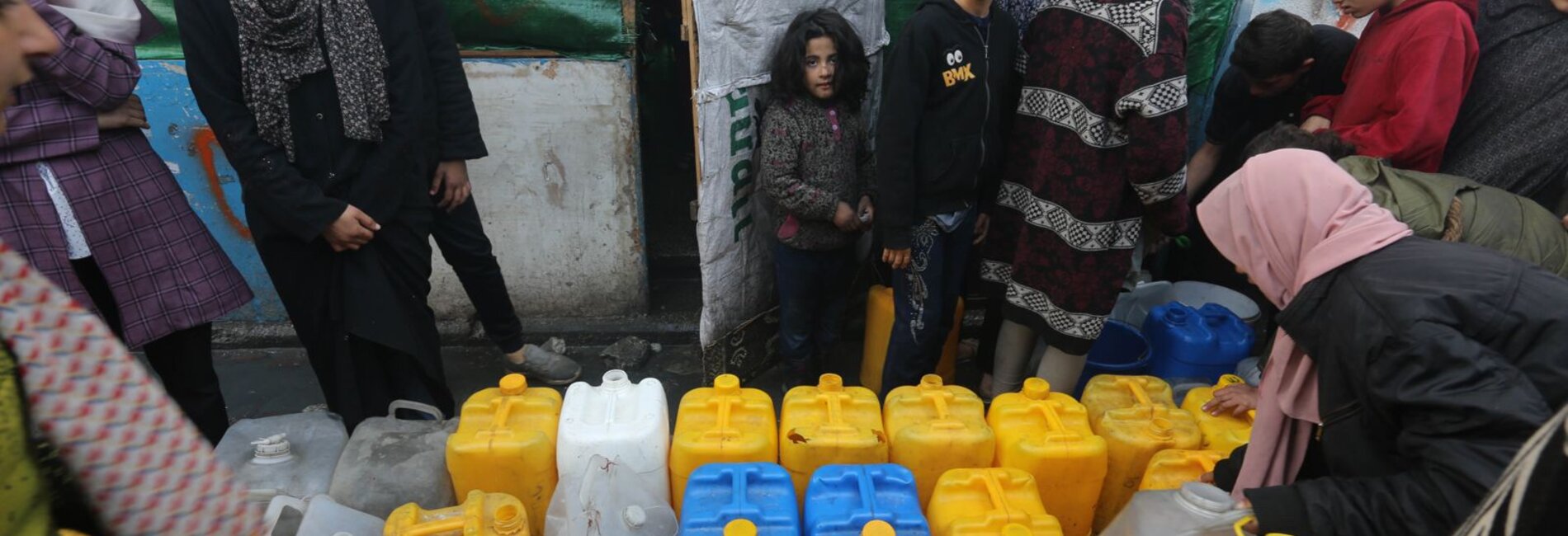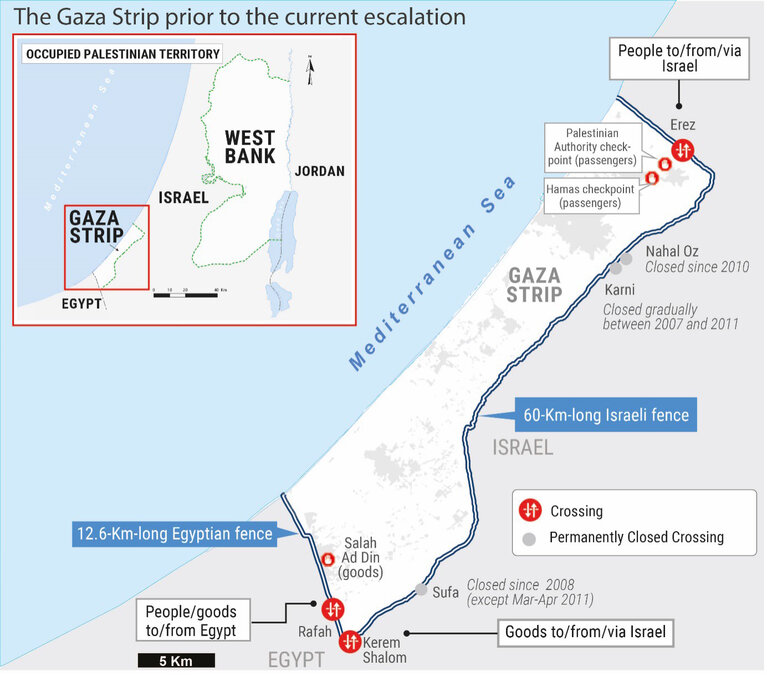Hostilities in the Gaza Strip and Israel | Flash Update #133
Key Highlights
- Eighteen people have so far died from malnutrition and dehydration, according to the Ministry of Health (MoH) in Gaza.
- A 13-year-old girl, the only survivor of her family, was rescued from under the rubble of her destroyed house after 40 hours.
- A UN report calls for fully-fledged independent investigations into all reports of sexual violence in Israel and the occupied Palestinian territory, including sexual violence committed against Israeli hostages and during the 7 October attacks in Israel.
- According to UNICEF, 81 per cent of households in Gaza lack access to safe and clean water, with internally displaced persons (IDPs) among the most affected.
Gaza Strip Updates
- Intense Israeli bombardment and ground operations as well as heavy fighting between Israeli forces and Palestinian armed groups continue to be reported across much of the Gaza Strip, resulting in further civilian casualties, displacement, and destruction of houses and other civilian infrastructure.
- Between the afternoon of 5 March and 10:30 on 6 March, according to the MoH in Gaza, 86 Palestinians were killed, and 113 Palestinians were injured. Between 7 October 2023 and 10:30 on 6 March 2024, at least 30,717 Palestinians were killed in Gaza and 72,156 Palestinians were injured, according to MoH in Gaza.
- According to a press release by UN Women on 1 March, an estimated 9,000 women have been reportedly killed by Israeli forces in Gaza to date, not including those believed to be dead under the rubble. “Every day the war in Gaza continues, at the current rate, an average of 63 women will continue to be killed. An estimated 37 mothers are killed every day, leaving their families devastated and their children with diminished protection.”
- Between the afternoons of 5 and 6 March, according to the Israeli military, there were no Israeli soldiers killed in Gaza. As of 6 March, 244 soldiers have been killed and 1,451 soldiers injured in Gaza since the beginning of the ground operation, according to the Israeli military. In addition, over 1,200 Israelis and foreign nationals have been killed in Israel, the vast majority on 7 October. As of 6 March, the Israeli authorities estimate that 134 Israelis and foreign nationals remain captive in Gaza, including fatalities whose bodies are withheld.
- On 5 March, a 13-year-old girl who was trapped for 40 hours under the rubble of her destroyed house in Hamad city, west Khan Younis, was rescued and transferred to a field hospital in Rafah. Her entire family was killed. The Palestine Red Crescent Society (PRCS) and OCHA participated in her evacuation. On 4 March, the bodies of 41 Palestinians reportedly killed in various areas in Khan Younis were recovered from under rubble.
- On 4 March, a nurse who worked at a primary health clinic supported by Project Hope was killed, along with seven of his relatives, including a child and a pregnant woman, in a strike on their family home in Rafah. In a statement, Project Hope said: “We are outraged and heartbroken by the loss of Mohammed and the countless other innocent humanitarians, health workers, and civilians who have died during this conflict,” warning that their remaining team members in Gaza “are in imminent danger.” Since the onset of hostilities, 364 health workers have been killed, according to the MoH in Gaza.
- The following are among other deadly incidents reported between 4 and 5 March:
- On 4 March, at about 13:30, four Palestinians were reportedly killed when a house in Az Zaytoun area, in southeastern Gaza city, was hit.
- On 4 March, at about 21:00, 17 Palestinians were reportedly killed, and others injured, when a house near the European Gaza Hospital, in southern Khan Younis, was hit.
- On 5 March, at about 3:20, eight Palestinians were reportedly killed, and others injured, when a residential square in Jabalya Camp, in North Gaza, was struck. Additional casualties have reportedly remained under rubble.
- On 6 March, MoH in Gaza reported that 18 people have so far died of malnutrition and dehydration, and that starvation in northern Gaza has reached fatal levels, particularly affecting children, pregnant women and people suffering from chronic illnesses. UNFPA recently cautioned that “malnutrition rates among pregnant and breastfeeding women have surged, posing significant health risks to both mothers and newborns.”
- On 4 March, the UN Special Representative of the Secretary-General on Sexual Violence in Conflict, Pramila Patten, reported that she and a team of experts “ found clear and convincing information that sexual violence, including rape, sexualized torture, cruel, inhuman and degrading treatment has been committed against hostages and has reasonable grounds to believe that such violence may be ongoing against those still held in captivity” in Gaza. The team also found “reasonable grounds to believe that conflict-related sexual violence occurred in multiple locations during the 7 October attacks,” and noted that the full extent “may take months or years to emerge and may never be fully known.” The report followed an official visit to Israel at the invitation of the Government, between 29 January and 14 February. The team also visited Ramallah, where the mission heard concerns raised over cruel, inhuman and degrading treatment of Palestinians in detention, including sexual violence in the form of invasive searches, threats of rape and prolonged forced nudity. The report’s recommendations include a call for the Israeli Government to grant full access to the UN Human Rights Office (OHCHR) and the Human Rights Council- mandated independent Commission of Inquiry on the occupied territory to conduct fully-fledged independent investigations into all alleged violations. The Special Representative also called on Hamas to immediately and unconditionally release all hostages and to ensure their protection, including from sexual violence, and for all relevant and competent bodies to bring all perpetrators of sexual violence to justice. The Special Representative reiterated the Secretary-General’s call for a humanitarian ceasefire.
- The provision of essential water, hygiene and sanitation (WASH) services in Gaza remains severely hindered by the months-long cut in power supply across Gaza, limited fuel supplies for backup generators, the destruction of infrastructure, and access constraints. According to UNICEF, 81 per cent of households lack access to safe and clean water, with IDPs living in overcrowded collective centres or informal sites being among the most affected. A rapid assessment conducted by WASH Cluster partners between 4 and 18 February at 41 IDP sites in Rafah governorate reveals that people have access to only two litres of water per person per day for drinking, cooking, washing and other domestic purposes, mostly relying on water trucking. This is significantly below the recommended minimum standard of 15 litres per person per day. There is only one toilet available for every 341 people, only 24 per cent of assessed sites have latrines that offer safe and private access, and only 20 per cent have latrines accessible for persons with physical disabilities. At 39 per cent of the sites where showers are available, one shower is available for every 1,292 persons. The majority of sites (93 per cent) have some type of visible waste, including solid waste, human feces or stagnant water, and most (68 per cent) have informal or uncontrolled dumping areas. On 5 March, the Palestinian Central Bureau of Statistics (PCBS) and the Environment Quality Authority stated that Gaza is witnessing a public health and environmental disaster characterized by groundwater and soil contamination, the accumulation of large volumes of solid waste, and the daily flow of some 130,000 cubic metres (130 million litres) of untreated sewage to the Mediterranean Sea. According to the Municipality of Gaza, 70,000 tons of solid waste has accumulated in Gaza city.
West Bank Updates
- On 5 March, Israeli forces shot and killed a 16-year-old Palestinian boy from Urif village (Nablus) on Road 60 near Huwwara village (Nablus), allegedly after stabbing and seriously injuring an Israeli soldier. Also on 5 March, a Palestinian man died of wounds sustained on 29 February after being shot in the head by Israeli forces during an undercover operation in Jenin city. Since 7 October, 415 Palestinians have been killed and 4,648 Palestinians have been injured, including 712 children, in conflict-related incidents across the West Bank, including East Jerusalem, and Israel. During the same period, 15 Israelis, including four members of Israeli forces, were killed and 89 injured in conflict-related incidents in the West Bank, including East Jerusalem, and Israel.
- Since 7 October 2023, 616 people, including 294 children, have been displaced in Area C and East Jerusalem after their homes were demolished due to the lack of Israeli-issued building permits, which are almost impossible to obtain.
- Since 7 October, a total of 25 houses have been punitively demolished and two others sealed off, leading to the displacement of 138 Palestinians, including 57 children.
- Since 7 October, 853 Palestinians, including 350 children, have been displaced, following the destruction of 133 homes during operations carried out by Israeli forces across the West Bank. About 95 per cent of the displacement was reported in the refugee camps of Jenin, Nur Shams and Tulkarm.
- Since 7 October 2023, OCHA has recorded 622 Israeli settler attacks against Palestinians that resulted in Palestinian casualties (56 incidents), damage to Palestinian-owned property (495 incidents), or both casualties and damage to property (71 incidents).
Funding
- The Flash Appeal for the occupied Palestinian territory (OPT), which requests US$1.2 billion to meet critical needs of 2.7 million people across the OPT (2.2 million in the Gaza Strip and 500,000 in the West Bank, including East Jerusalem), was extended through the end of March 2024. As of 6 March, member states disbursed nearly $964 million against the updated Flash Appeal (78 per cent); this includes about $616 million out of $629 million (98 per cent) requested for October-December 2023 and $348 million out of $600 million (58 per cent) requested for January-March 2024. For funding analysis, please see the Flash Appeal Financial Tracking dashboard.
- The OPT Humanitarian Fund Unit (OPT HFU) is currently preparing for a more significant allocation to support response efforts under a ceasefire scenario, enabling a wider array of actors to participate in relief efforts. Priority sectors identified for immediate support include Food Security and Livelihoods (FSS), Multipurpose Cash Assistance (MPCA), WASH, Shelter, and Health, reflecting the most pressing needs in the Gaza Strip. Special attention is being given to directing funding and additional resources toward actors in areas that face significant access challenges, notably in central and northern Gaza. In the West Bank, innovative solutions are sought to address the impact of military activities on infrastructure and ensure operational effectiveness amid closures.
- The OPT HF and the Central Emergency Relief Fund (CERF) are currently funding more than 94 ongoing projects in the Gaza Strip to meet urgent humanitarian needs, notwithstanding constraints on the entry and delivery of aid into and within the Gaza Strip. These interventions, totalling about $88 million, address needs in the areas of food security, shelter, water, sanitation and hygiene (WASH), health and protection. Since 7 October, the OPT HF has received a total of $88 million in contributions from member states and private donors. Private donations are collected directly through the Humanitarian Fund.
For the Humanitarian Needs and Cluster Response Updates for the period between 27 February and 4 March, please visit: Humanitarian needs and response update | 27 February – 4 March 2024.
* Asterisks indicate that a figure, sentence, or section has been rectified, added, or retracted after the initial publication of this update.











